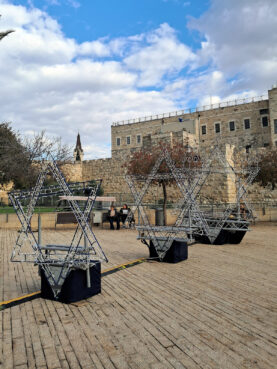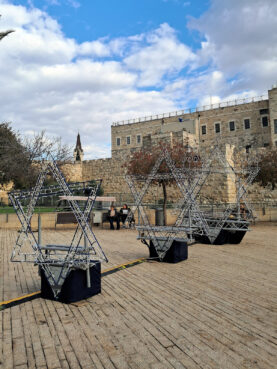Christmas, Hanukkah festivities slowly return to Holy Land amid shaky ceasefire

JERUSALEM (RNS) — In 2023 and 2024, David Ha’ivri, an Israeli tour guide, didn’t offer his popular English-language Hanukkah or Christmas tours. Tourism had plummeted after the Oct. 7, 2023, Hamas massacre and the start of the Hamas-Israel war, when nearly every international airline canceled flights to Israel.
But in the past few months, and especially after the shaky October ceasefire, tourism to Israel and the Bethlehem region of the West Bank has picked up, along with Israel’s national mood, to the point that Ha’ivri is once again offering Hanukkah tours for overseas visitors and English-speaking locals. The eight-day Festival of Lights began Dec. 14 at sundown and runs through Dec. 22.
“The airlines are reestablishing their service, and I think that’s a good barometer that people are prepared and eager to visit Israel,” said Ha’ivri, whose Christmas tours remain paused until more pilgrims return. “The mood here has changed. A lot of Israelis who were army reservists are mostly back at home with their families. We feel we’re getting back to a more normal atmosphere. We are an optimistic people. We know bad things can happen, but we want to believe that there are good things ahead of us.”
After two years of war and heartbreak, the ceasefire — despite violations — has given some hope that the war will end in the foreseeable future. While residents recognize hostilities could escalate, the atmosphere in Jerusalem and Bethlehem is palpably more festive for the holidays this year, with a full schedule of public holiday bazaars, concerts and events.
Many of the activities, once canceled out of respect for grieving families or because no one had the heart to celebrate, have returned. That’s especially true for social events timed for Hanukkah, which coincides with Jewish schools’ winter break in Israel.
“For two long years we kept saying, ‘We will dance again.’ Now — finally — we get to come together, light up the night, and move as one,” reads an invitation for a public dance party scheduled for the fifth night of Hanukkah.


And, for the first time since the start of the war, many Christian communities in Israel and the West Bank are celebrating Christmas publicly. In 2023, Holy Land church leaders asked their congregations “to set aside unnecessary celebrations.” They spoke against putting up Christmas decorations and hosting concerts, markets and the outdoor lightings of Christmas trees out of solidarity with suffering Palestinians in Gaza.
A year later, the church leaders reversed their decision, but last year’s celebrations were mostly indoors and revolved around family and prayer.
This year, though, Cardinal Pierbattista Pizzaballa, the Latin Patriarch of Jerusalem, encouraged locals and other Catholics around the world to openly celebrate Christ’s birth in the Holy Land. Christian businesses have been especially hard hit by the dearth of pilgrims because they rely heavily on tourism for their livelihoods.
At the Notre Dame of Jerusalem Center, a Catholic guesthouse and meeting place across the street from the Christian Quarter of the Old City of Jerusalem, a tall decorated Christmas tree graces the entrance. A large Nativity scene and another shimmering tree await visitors in the festively decorated lobby.

Asked whether Christmas feels different this year, Yousef Barakat, the center’s director, said, “Yes and no.”
“For two years we didn’t make any decorations, just prayers in the churches,” he said. “But the patriarch told us we must create Christmas joy for the children. They deserve to be happy.”
At the same time, Barakat said, “there are almost no pilgrims” this year. Although hotel occupancy is “very low” in both Jewish-majority West Jerusalem and Arab-majority East Jerusalem, he said “we are more dependent on pilgrims from outside the country” than West Jerusalem hotels that cater to both Jewish and non-Jewish tourists.
Before the Hamas attack, Notre Dame employed 180 people. Today that number is 75. “Still, the ceasefire is giving us hope,” Barakat said. “We are hosting a charity bazaar and a concert by a Christian band. You can feel the difference between now and two years ago.”
Nabil Razzouk, a Coptic Christian tour guide who lives in Jerusalem, has not led a tour group since the Hamas attack on Oct. 7.

“I had hoped some groups would come this Christmas, but I waited until the end of November, and when no bookings came, I flew to Vienna, where I’m being hosted by relatives,” Razzouk said in a phone call from Austria. “My earliest booking is with a pastor who is bringing a group from America this spring.”
Just inside the entrance to the Christian Quarter on the third Sunday of Advent, laborers and vendors were racing to complete the preparations for the return of the Christmas market. The thud of hammers mixed with the sounds of Western Christmas songs.
“We hope the war is finally finished and that we’ll have a marvelous Christmas this year,” said Daoud Kassabry, director of the Collège des Frères Catholic school in the Christian Quarter, as he prepared for the public Christmas tree lighting at his school as sundown approached.
“Today, we are lighting the third candle of the Advent season,” he said. “It is the candle of joy and hope.”




